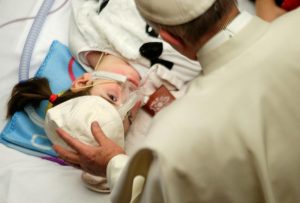Health care professionals always must “promote the dignity and life of each person and reject any compromise in the direction of euthanasia, assisted suicide or suppression of life, even in the case of terminal illness,” Pope Francis said.
“Life is sacred and belongs to God,” the pope said, “hence it is inviolable, and no one can claim the right to dispose of it freely.”
Pope Francis addressed health care professionals in his annual message for the celebration of World Day of the Sick, which is marked Feb. 11, the feast of Our Lady of Lourdes. The text of the message was released Jan. 3 by the Vatican.
To people suffering from illness in body or mind, the pope offered words of hope and encouragement, assuring them of Jesus’ closeness and his promise to alleviate their burdens.
“Jesus does not make demands of those who endure situations of frailty, suffering and weakness, but offers his mercy and his comforting presence,” the pope said.
Jesus “looks upon a wounded humanity with eyes that gaze into the heart of each person,” he said. “That gaze is not one of indifference; rather, it embraces people in their entirety, each person in his or her health condition, discarding no one, but rather inviting everyone to share in his life and to experience his tender love.”
In Jesus, the pope said, those who are sick “will find strength to face all the worries and questions that assail you during this ‘dark night’ of body and soul.”
And, he said, within the church they should find welcome, concern and gentle care, “a home where you can encounter his grace, which finds expression in closeness, acceptance and relief.”

In a section of the message addressed to physicians, nurses and other health professionals, Pope Francis urged them to “remember that diagnostic, preventive and therapeutic treatments, research, care and rehabilitation are always in the service of the sick person; indeed the noun ‘person’ takes priority over the adjective ‘sick.'”
Catholic health care professionals “can make patients feel the presence of Christ, who consoles and cares for the sick and heals every hurt.”
“Life must be welcomed, protected, respected and served from its beginning to its end: both human reason and faith in God, the author of life, require this,” Pope Francis said.
Sometimes, he told Catholic health workers, “conscientious objection becomes a necessary decision if you are to be consistent with your ‘yes’ to life and to the human person.”
Like all Christians, he said, they must safeguard “the truest human right, the right to life.”
And, the pope told them, “when you can no longer provide a cure, you will still be able to provide care and healing, through gestures and procedures that give comfort and relief to the sick.”
Pope Francis also urged governments to do more to ensure that all their citizens, especially the poor, have access to quality medical care, and he thanked “volunteers who serve the sick, often compensating for structural shortcomings, while reflecting the image of Christ, the good Samaritan, by their acts of tender love and closeness.”
The text of the pope’s message can be found here.






















